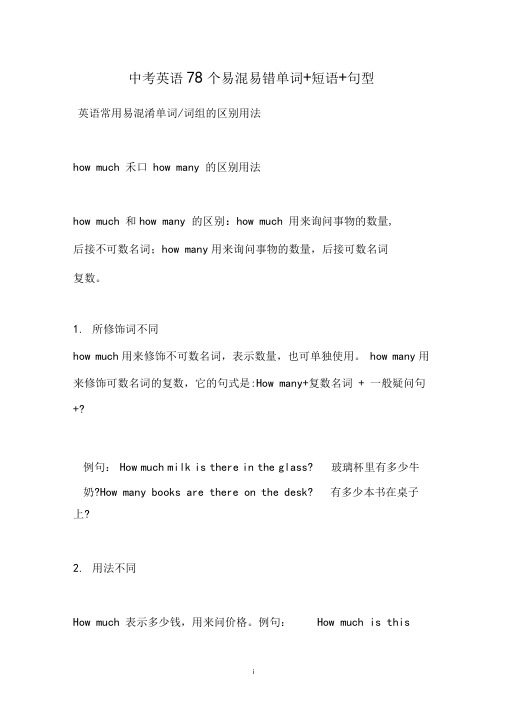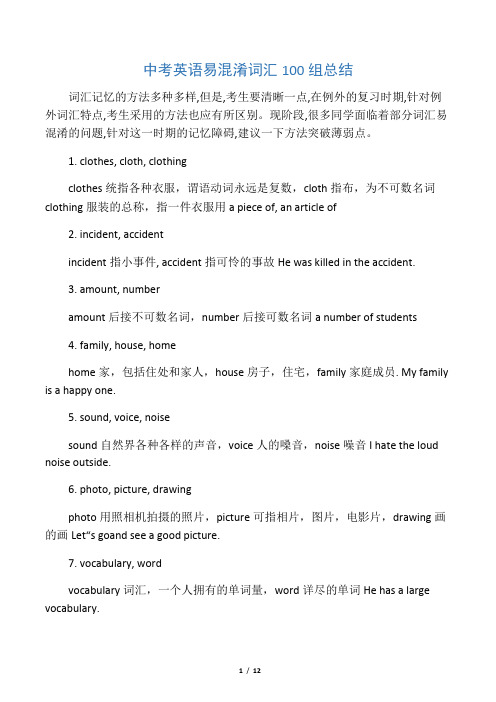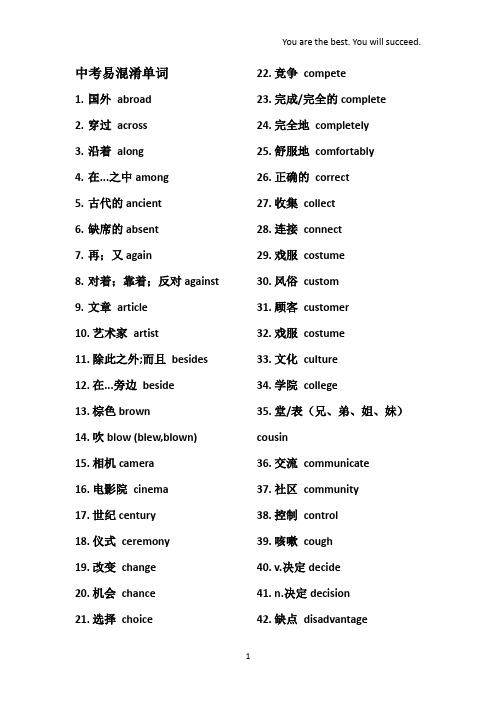中考英语78个易混易错单词
中考英语78个易混易错单词

中考英语78个易混易错单词+短语+句型英语常用易混淆单词/词组的区别用法how much 禾口how many 的区别用法how much 和how many 的区别:how much 用来询问事物的数量,后接不可数名词;how many用来询问事物的数量,后接可数名词复数。
1.所修饰词不同how much用来修饰不可数名词,表示数量,也可单独使用。
how many用来修饰可数名词的复数,它的句式是:How many+复数名词+ 一般疑问句+?例句:How much milk is there in the glass? 玻璃杯里有多少牛奶?How many books are there on the desk? 有多少本书在桌子上?2.用法不同How much 表示多少钱,用来问价格。
例句:How much is thisdress?这个连衣裙多少钱?How many 表示多少,用来问数量。
例句:How many apples do you have? 你有多少苹果?in 和on 的区别用法当我们表示某些东西被其他东西所包围时使用“in ”这个词。
而“on ” 用于描述物体被放置在其他物体上方或外部的情况。
in 可表时间,表地点,表手段、方法、材料。
on 表示时间、地点、方位等。
1.意思不同in :prep. 在... 里;在... 地方;在... 期间on :prep. 在... 之上2.用法不同in :in 着重一段时间的过程,常用于重复动作或延续动作。
in 表示从现在时间算起推移到将来的一段时间之后,一般与将来时态连用。
例句:He is a layman in economics. 他对经济学一窍不通。
on :表示“在物体的表面上” ,只能用on 的表达方式有on the next morning ,on the following 。
例句:The spider is walking on theceiling. 蜘蛛在天花板上爬行。
初中英语易混淆单词

初中英语易混淆单词The document was prepared on January 2, 2021初中英语易混淆单词1:pronounce 发.......音 , pronunciation 发音2:hard adj.& adv. 硬的;辛苦地,努力地 hardly adv.几乎不3:change v. 改变 chance n. 机会4:feel felt v. 感觉,感到 fallfell v. 落下5:sleepy feel sleepy adj. 困倦的 asleep fall asleep adj. 睡着的6:different adj.不同的 difference n.不同点7:important adj.重要的 importance n.:重要性8:confident adj. 自信的 confidence n.想、自信9:distant adj. 远的 distance n.距离10:appear v.出现 appearance n.出现,外貌11:difficult adj.难的 difficulty n.难点12:expect v. 期望 except prep.除.........之外 accept v.接收13:though adv.$conj. 尽管;虽然 through adv.&prep 穿过thought n.想法 v.think 的过去式14:pass v.经过,通过 past adj.过去的 n. 过去15:sometimes 有时 some times 几次 sometime 某个时候 some time 一段时间16:shake v.动摇 snake n.蛇 snack n.小吃17:quite adv.相当 quiet adj.安静的 quick adj.快的18:affect v.影响 effect n.结果,影响 effort n.努力19:dessert n.甜食 desert n.沙漠v.放弃20:costume n.服装 custom n.习惯21:chicken n.鸡 kitchen n.厨房22:steal stole,stolen v.偷 steel n.钢23:decide v.决定 decision n.决定24:discuss v.讨论 discussion n.讨论25:express v.表达 expression n.表达26:invite v.邀请 invitation n.邀请27:imagine v.想象 imagination n.想象28:organize v.组织 organization n.组织29:communicate v.交流 communication n. 交流30:operate v.操作 operation n.交流31:create v.创造 creation n.创造 creative adj.有创造力的32:attract v.吸引 attraction n.吸引 attractive adj.吸引人的33:translate v.翻译 translation n.翻译34:celebrate v.庆祝 celebration n.庆祝35:pollute v.污染 pollution n.污染36:invent v. 发明 invention n. 发明 inventor n.发明家37:produce v.制造 production n.制造38:introduce v.介绍 introduction n.介绍39:tradition n.传统 traditional adj.传统的 traditionally adv.传统地40:exhibition n.展览41:composition n.作文 competition n.比赛42:succeed v.成功 success n. 成功 successful adj.成功的 successfully adv.成功地43:medicine n.药 medical adj.医疗的44:chemistry n.化学 chemical adj.化学的45:music n.音乐 musical adj.音乐的 musician n.音乐家46:science n.科学 scientific adj.科学的 scientist n.科学家47:safe adj.安全的 safely adv.安全地 safety n.安全48:danger n.危险 dangerous adj 危险的49:humor n 幽默 humorous adj 幽默的50:breath n 呼吸 breathe v呼吸51:afford v买得起 buy v买52:tourist n游客 tourism n旅游53:please v请 pleased adj满意的 pleasant adj愉快的 pleasure n愉快54:argue v争论 agreement n争论55:agree v.同意 agreement n.同意56:develop v.发展 development n发展57:government n政府 environment n环境58:advise v建议 advice 建议59:high adj高的 height n高度60:fly v飞 flight n飞行航班61:weigh v重 weight n重量62:office n办公室 official adj官方的63:provide sb.with sth. =provide sth for sb 为某人提供某物64:nation n国家民族 national adj国家的 nationality n国籍65:France n法国 French adj法国的 n法国人,法语66:Egypt n埃及 Egyptian adj 埃及的 n埃及人,古埃及语67:Canada n加拿大 Canadian adj加拿大的 n加拿大人68:Greece n希腊 Greek adj希腊的 n希腊人 ,希腊语69:Europe n欧洲 European adj欧洲的 n欧洲人70:Italy n意大利 Italian adj意大利的 n意大利人,意大利语71:Russia n俄罗斯 Russian adj俄国的 n俄国人俄语72:Britain n不列颠,英国 British adj 英国的73:Australia n澳大利亚 Australian adj 澳大利亚的 n澳大利亚人74:Germany n德国 German adj德国的 n德国人,德语1:Invite v邀请 invite sb to do 邀请某人做某事2:invent v发明 invention n发明 inventor n发明家3:ever 曾经 even 1.更用于比较级前 even worse 更差 even thought 虽然2.甚至 Even my father couldn’t help laughing .甚至我父亲都忍不住笑了.4:event n事件5:rise-rose-risen vi升起 The sun rises in the east. 太阳在东边升起.raise vt举起某物 Please raise your hand if you know the answer.Vt.筹集 raise money 筹钱6:though=although 虽然 even though 虽然7:thoughtthink 思考的过去式也可以做名词,想法,念头8:through 通过空间through the forest 穿过森林.9:expect 期待 expect sb to do sth. 期待某人做某事.10:except 除了... 不含在内everyone ishere except John. 除了John 每个人都在.11:accept v接受12:quite 非常,十分 He speaks English quite well. quite a few 相当多13:quiet 安静的 be quiet 保持安静14:quick 快的 quickly 快得 He runs as quickly as Tom. 他和Tom 跑的一样快. 15:composition 作文16:competition 竞赛17:afford 负担、买得起 It’s too expensive,so I can’t afford it. 太贵了,我买不起.18:effort n努力 with effort 努力地 without effort 毫不费力19:affect v影响20:pair 一对,一双,一副 a pair effect on sth. 对... 有影响21:sheep sheep 羊单复数同型22:sleep 睡觉 go to sleep23:repair v修理 repair machines 修理机器24:government 政府25:environment 环境26:pass v经过传递 Can you pass me a piece of paper 你能递给我一张纸吗27:past n过去 in the past 在过去 half past two 两点半28:fell v动词 fall 的过去式29:feel v感官动词感觉,感到注意:fall fell fallen v落下 feel felt v感觉30:sleepy adj困倦的 asleep adj 睡着的注意:fall asleep 入睡 feel sleepy 感到疲倦.31:different adj 不同的 difference n不同点32:except prep除...之外 expect v期望要求 accept 接受注意 besides 的意思是除...外还有 ,except 的意思是不包括在内33:though adv&conj 尽管虽然through adv&prep 从一变到另一边,穿过another pron 再一,又一34:other adj其他的,另外的注意 others 是指另外的人或物 ,是一个名词,相当于 other+n.The other 是指两个中的另一个,其余的;the others 是指其余的人或物,相当于 the other+n.35:pass v经过通过传递考试及格Past adj 过去的pass的过去式分词注意:pass-passed-passed/past36:sometimes 有时 some times 几次 sometime 某个时候 some time 一段时间37:quite 相当 quiet 安静地38:affect v影响 effect n结果影响39:dessert 甜食 desert 沙漠放弃40:costume 服装 custom 习惯41:chicken 鸡 kitchen 厨房42:steal 偷 steel 钢。
中考英语最易混淆词汇汇总

中考英语最易混淆词汇汇总1. clothes, cloth, clothingclothes统指各种衣服,谓语动词永远是复数, cloth指布,为不可数名词clothing 服装的总称,指一件衣服用a piece of, an article of2. incident, accidentincident指小事件, accident指不幸的事故He was killed in the accident.3. amount, numberamount后接不可数名词, number后接可数名词 a number of students4. family, house, homehome 家,包括住处和家人,house房子,住宅,family家庭成员. My family is a happy one.5. sound, voice, noisesound自然界各种各样的声音,voice人的嗓音,noise噪音I hate the loud noise sutside.6. photo, picture, drawingphoto用照相机拍摄的照片,picture可指相片,图片,电影片,drawing画的画Let's go and see a goodpicture.7. vocabulary, wordvocabulary词汇,一个人拥有的单词量,word具体的单词He has a large vocabulary.8. population, peoplepopulation人口,人数,people具体的人 China has a large population.9. weather, climateweather一天内具体的天气状况,climate长期的气候状况The climate here is not good for you.10. road, street, path, wayroad具体的公路,马路,street街道,path小路,小径, way道路,途径take this road; in the street, show me the way to the museum.11. course, subjectcourse课程(可包括多门科目),subject科目(具体的学科)a summer course12. custom, habitcustom传统风俗,习俗,也可指生活习惯,后接to do, habit生活习惯,习惯成自然,后接of doing. I've got the habit ofdrinking a lot.13. cause, reasoncause 指造成某一事实或现象的直接原因,后接ofsth./doing sth,reason用来解释某种现象或结果的理由,后接for sth./doing sth. the reason for being late14. exercise, exercises, practiceexercise运动,锻炼(不可数),exercises练习(可数), practice(反复做的)练习 Practice makesperfect.15. class, lesson作"课"解时,两者可以替换.指课文用lesson. 指班级或全体学生用class. lesson 6; class 516. speech, talk, lecturespeech指在公共场所所做的经过准备的较正式的演说,talk日常生活中的一般的谈话,讲话,lecture学术性的演讲, 讲课 a series of lecture on…17. officer, officialofficer部队的军官,official政府官员 an armyofficer18. work, job二者均指工作。
中考英语易混淆单词

You are the best. You will succeed.中考易混淆单词1.文章article2.艺术家artist3.缺点disadvantage4.邀请invite5.发明invent6.决定decide7.分开divide8.最近recently9.嘴巴mouth10.月month11.老鼠mouse12.钱money13.猴子monkey14.承诺promise15.产品product16.控制control17.咳嗽cough18.外国人foreigner19.花园garden20.地理geography21.胶水glue 22.高度height23.幽默的humorous24.产业;工业industry25.面试;采访interview26.介绍introduce27.指示instruction28.奖牌medal29.铁的metal30.精神上的mental31.医学的medical32.模型model33.药medicine34.机器machine35.组织organization36.交流communicate37.社区community38.合适地properly39.可能perhaps40.可能地possibly41.可能地probably42.村庄village43.学院collegeYou are the best. You will succeed.44.大学university45.兔子rabbit46.习惯habit47.爱好hobby48.法语/法国人的French49.德语/德国人的German50.日语/日本人的Japanese51.躺/撒谎lie (lay, lain)52.下蛋lay( laid, laid)53.风俗custom54.海关customs55.文化culture56.顾客customer57.戏服costume58.堂/表(兄、弟、姐、妹)cousin59.实验experiment60.经验;经历experience61.立刻immediately62.英镑pound63.水池pond64.小学生pupil 65.紫色purple66.价格price67.奖品prize68.表扬praise69.正是exactly70.尤其;特别especially71.星球planet72.种植/植物plant73.参观者visitor74.周二Tuesday75.周四Thursday76.周三Wednesday77.厕所toilet78.雨伞umbrella79.银器silver80.围巾scarf81.分离separate82.标准standard83.猜想;设想suppose84.建议;表明suggest85.朝;向toward(s)86.第九ninthYou are the best. You will succeed.87.第十二twelfth88.第四十fortieth89.第九十ninetieth90.象征symbol91.标志sign92.害怕的(形容人)scared93.害怕的(形容物)scary94.惊讶的(形容人)surprised95.令人惊讶的(形容物)surprising96.胃痛stomachache97.社会society98.社会的social99.服务service100.摇动shake(shook, shaken)101.偷steal(stole, stolen) 102.成功v.succeed103.成功n.success104.科技technology105.珍宝treasure106.网球tennis 107.糖sugar108.精神spirit109.改变change110.机会chance111.除了except112.期望expect113.竞争compete114.完成/完全的complete 115.完全地completely 116.舒服地comfortably 117.正确的correct118.收集collect119.连接connect120.耐心的patient121.有礼貌的polite122.准备prepare123.更喜欢prefer124.挖dig(dug, dug)125.拥抱hug(hugged,hugged) 126.十分quite127.安静的quiet128.毕业graduateYou are the best. You will succeed. 129.逐渐地gradually130.大体的general131.国外abroad132.穿过across133.沿着along134.通过through135.虽然though/although136.渔夫fisherman137.除此之外besides138.在...旁边beside139.预防prevent140.保护protect141.污染pollute142.客人guest143.门卫;士兵guard144.导游guide145.意识到realize146.提醒remind147.乘客passenger148.段落/走廊passage149.骄傲的proud150.骄傲pride。
中考英语易混淆词汇组总结

中考英语易混淆词汇100组总结词汇记忆的方法多种多样,但是,考生要清晰一点,在例外的复习时期,针对例外词汇特点,考生采用的方法也应有所区别。
现阶段,很多同学面临着部分词汇易混淆的问题,针对这一时期的记忆障碍,建议一下方法突破薄弱点。
1. clothes, cloth, clothingclothes统指各种衣服,谓语动词永远是复数,cloth指布,为不可数名词clothing服装的总称,指一件衣服用a piece of, an article of2. incident, accidentincident指小事件, accident指可怜的事故He was killed in the accident.3. amount, numberamount后接不可数名词,number后接可数名词a number of students4. family, house, homehome家,包括住处和家人,house房子,住宅,family家庭成员. My family is a happy one.5. sound, voice, noisesound自然界各种各样的声音,voice人的嗓音,noise噪音I hate the loud noise outside.6. photo, picture, drawingphoto用照相机拍摄的照片,picture可指相片,图片,电影片,drawing画的画Let“s goand see a good picture.7. vocabulary, wordvocabulary词汇,一个人拥有的单词量,word详尽的单词He has a large vocabulary.8. population, peoplepopulation人口,人数,people详尽的人China has a large population.9. weather, climateweather一天内详尽的天气状况,climate长期的气候状况The climate here is not good foryou.10. road, street, path, wayroad详尽的公路,马路,street街道,path小路,小径,way道路,途径take this road; in the street, show me the way to the museum.11. course, subjectcourse课程(可包括多门科目),subject科目(详尽的学科)a summer course12. custom, habitcustom传统风俗,习俗,也可指生活习惯,后接to do,habit生活习惯,习惯成自然,后接of doing. I“ve got the habit of drinking a lot.13. cause, reasoncause指造成某一事实或现象的直接原因,后接of sth./doing sth,reason用来解释某种现象或结果的理由,后接for sth./doing sth. the reason for being late14. exercise, exercises, practiceexercise运动,锻炼(不可数),exercises练习(可数),practice(反复做的)练习Practicemakes perfect.15. class, lesson作“课“解时,两者可以替换.指课文用lesson.指班级或全体学生用class. lesson 6; class 516. speech, talk, lecturespeech指在公共场所所做的经过准备的较正式的演说,talk日常生活中的大凡的谈话,讲话,lecture学术性的演讲,讲课a series of lecture on…17. officer, officialofficer部队的军官,official政府官员an army officer18. work, job二者均指工作。
中考易混淆单词

You are the best. You will succeed.中考易混淆单词1.国外abroad2.穿过across3.沿着along4.在...之中among5.古代的ancient6.缺席的absent7.再;又again8.对着;靠着;反对against9.文章article10.艺术家artist11.除此之外;而且besides12.在...旁边beside13.棕色brown14.吹blow (blew,blown)15.相机camera16.电影院cinema17.世纪century18.仪式ceremony19.改变change20.机会chance21.选择choice 22.竞争compete23.完成/完全的complete24.完全地completely25.舒服地comfortably26.正确的correct27.收集collect28.连接connect29.戏服costume30.风俗custom31.顾客customer32.戏服costume33.文化culture34.学院college35.堂/表(兄、弟、姐、妹)cousin36.交流communicate37.社区community38.控制control39.咳嗽cough40.v.决定decide41.n.决定decision42.缺点disadvantageYou are the best. You will succeed.43.挖dig(dug, dug)44.邀请invite45.发明invent46.邀请invitation47.发明invention48.分开divide49.电electricity50.电的electric51.电子的elcetronic52.实验experiment53.经验;经历experience54.尤其;特别especially55.确切地exactly56.极好的;优秀的excellent57.除了except58.期望expect59.表达express60.表现behave61.表扬perform62.渔夫fisherman63.第四fourth64.十四fourteen 65.第四十fortieth66.法语/法国人的French67.法国France68.外国人foreigner69.花园garden70.地理geography71.毕业graduate72.逐渐地gradually73.大体的general74.客人guest75.门卫;士兵guard76.导游guide77.德语/德国人的German78.德国Germany79.习惯habit80.爱好hobby81.幽默的humorous82.高度height83.重量weight84.加热heat85.心脏heart86.拥抱hug(hugged,hugged)87.隐藏hide(hid,hidden)88.放;下(蛋)lay( laid, laid)89.躺lie (lay, lain)90.撒谎(lied,lied)91.邀请invite92.发明invent93.产业;工业industry94.面试;采访interview95.介绍introduction96.指示;指令instruction97.立刻immediately98.日语/日本人的Japanese99.模型model100.中间的middle101.嘴巴mouth102.月month103.老鼠mouse104.钱money105.猴子monkey106.奖牌medal107.铁的metal108.精神上的mental 109.医学的medical110.药medicine111.机器machine112.材料material113.第九ninth114.九十ninety115.(两者)都不neither 116.(三者以上)都不none 117.第九十ninetieth 118.乘客passenger119.段落/走廊passage 120.合适地properly121.可能地possibly122.可能地probably123.承诺promise124.产品product125.英镑pound126.骄傲的proud127.骄傲n. pride128.小学生pupil129.紫色purple130.价格price131.奖品prize132.表扬;赞扬praise 133.星球planet134.种植/植物plant 135.荣幸;快乐pleasure 136.完美的perfect 137.耐心的patient 138.有礼貌的polite 139.飞行员pilot140.准备prepare 141.更喜欢prefer 142.预防prevent 143.保护protect144.污染pollute145.生产v. produce 146.过程n.process 147.十分quite148.安静的quiet 149.收到receive150.意识到realize 151.提醒remind152.复习,回顾review 153.害怕的(形容人)scared 154.害怕的(形容物)scary 155.酸的sour156.咸的salty157.糖sugar158.卖;销售n.sale159.卖;销售V.sell160.v.服务serve161.n.服务service162.n.仆人servant163.围巾scarf164.分离separate165.小吃,零食snack 166.蛇snake167.标准standard168.严格的strict169.严肃的,认真的serious 170.象征symbol171.标志sign172.社会society173.社会的social174.偷steal(stole, stolen)175.摇晃shake(shook,shaken) 176.传播spread177.速度speed178.猜想;设想suppose 179.支持support180.建议suggest181.成功v.succeed182.成功n.success183.通过through184.虽然though/although 185.扔throw (threw, thrown) 186.周二Tuesday187.周四Thursday188.十三thirteen189.三十thirty190.十二twelve191.第十二twelfth192.朝;向toward(s)=to 193.向前forward194.厕所toilet195.珍宝treasure196.雨伞umbrella 197.大学university 198.参观者visitor 199.视频;录像video 200.周三Wednesday 201.天气weather 202.是否whether。
(完整版)初中常见易混淆英语词汇

1.sound, voice, noisesound自然界各种各样的声音,voice人的嗓音,noise噪音I hate the loud noise outside.2. exercise, exercises, practiceexercise运动,锻炼(不可数),exercises练习(可数),practice(反复做的)练习take exercise 做运动3. work, job二者均指工作。
work不可数,job可数a good job,What interesting work it is!4. cook, cookercook厨师,cooker厨具He is a good cook.5. police, policemanpolice警察的总称,后接复数谓语动词,policeman 指某个具体的警察The police are questioning everyone in the house.6. problem, questionproblem常和困难联系,前面的动词常为think about, solve, raise,question常和疑问联系,多和ask, answer连用7. price, prizeprice价格,prize奖,奖品,奖金win the first prize The price is high/low.8. a number of, the number ofa number of许多,谓语动词用复数。
the number of…的数目,谓语动词用单数。
The number of students is increasing.9. in front of, in the front ofin front of范围外的前面,in the front of范围内的前面A boy sits in the front of the room.10. next year, the next yearnext year将来时间状语,the next year过去将来时间状语He said he would go abroad the next year.11. in bed, on the bedin bed卧在床上,on the bed在床上The book is on the bed. He is ill in bed.12. the people, a peoplethe people指人,a people指民族The Chinese is a peace-loving people.13. it, oneit同一物体,one同类不同一I lost my pen. I have to buy a new one.14. that, thisthat指代上文所提到的,this导出下文所要说的I was ill. That's why…15. none, nothing, no onenone强调有多少,nothing, no one强调有没有,nothing指物,no one指人--- How many…/How much…? --- None.16. anyone, any oneanyone指人,不能接of,any one指人/物均可,可接of, any one of you17. who, whatwho指姓名或关系,what指职业或地位What is your dad? He is a teacher.18. what, whichwhat的选择基础是无限制的,which在一定范围内进行选择Which do you prefer, bananas or apples?19. other, anotherother后接名词复数,another后接名词单数other students, another student20. many, much, a lot ofmany和可数名词连用,much和不可数名词连用,a lot of可数,不可数均可,但不用于否定句I haven't many books.21. much more…than, many more…thanmuch more…than后接形容词或不可数名词,many more…than后接可数名词many more people, much more water, much more beautiful22. no, notno=not a/any, no friend=not a/any friend, no water=not any water23. by oneself, for oneself, to oneselfby oneself单独的,独自的,for oneself为自己,to oneself供自己用的24. at all, after allat all根本,全然, after all到底,毕竟After all he is a child.25. tall, hightall常指人或动物,high常指物体He is tall.26. fast, quicklyfast侧重于指人或物体具有运动速度快的特点,quickly侧重指某事完成或发生的快run fast, answer the question quickly27. high, highlyhigh具体的高,highly抽象的高,高度的think highly of(高度赞扬)28. sleeping, asleep, sleepysleeping正在睡觉,asleep睡着,熟睡,只能做表语,sleepy困的,有睡意的a sleeping baby,The baby is asleep. I'm sleepy.29. real, truereal真的,真实的,指的是事实上存在而不是想象的,true真的,真正的,指的是事实和实际情况相符合real gold, a true story30. pleasant, pleased, pleasingpleasant常用作定语,pleased常用作表语,pleased主语常为人,a pleasant trip,be pleased with…对…感到满意/开心31. ill, sickill做表语,sick定语、表语均可a sick boy, He is sick/ill.32. good, wellgood形容词,well副词,但指身体状况是形容词He is well again.33. hard, hardlyhard努力,hardly几乎不work hard, I can hardly believe it.34. excited, excitingexcited使人兴奋的,exciting令人兴奋的I'm excited. The news is exciting.35. before long, long beforebefore long不久以后,long before很久以前36. happy, gladhappy高兴,幸福,定表均可,glad高兴,只能做表语a happy girl, I’m happy/ glad to see you.37. instead, instead ofinstead是副词,放在句首或句末,instead of是介词短语,放在句中He didn't see a film. Instead he watched TV. He watched TV instead of seeing a film.38. too much, much tootoo much 后接不可数名词,much too后接形容词much too heavy39. raise, riseraise及物动词,rise不及物动词The sun rises in the east. Raise your hand, please.40. bring, take, carry, fetchbring拿来,take带走,carry随身携带,fetch去回这一往返动作fetch a box of chalk41. spend, take, pay, costspend人做主语,花钱,花时间; s pend…on sth./(in) doing sth; take物做主语,花时间; It takes sb some time to do sth.; pay人做主语,花钱,pay for; cost物做主语,花钱;sth cost some money42. join, join in, take part injoin加入某个组织,并成为其中的一员;join in参加小型的活动, join sb. in;take part in 参加大型的活动He joined the army five years ago.43. learn, studylearn学习,侧重学习的结果,study学习,侧重学习的过程,研究study the problem44. want, hope, wishwant打算,想要,want to do, want sb. to do, hope希望(通常可以实现),hope to do/ hope that… wish希望(通常不能实现)wish (sb.) to do, wish sb/sth. + n. I wish you success.45. answer, replyanswer及物动词,reply不及物动词,后接to, reply to the letter46. leave, leave forleave离开,leave for前往He left Beijing for Shanghai.47. drop, falldrop及物\不及物均可,fall不及物动词Prices fell/dropped. He dropped his voice.48. win, lose, beatwin后接sth.,反义词为lose, beat后接sb. win the game, beat them49. live on, live bylive on以…为主食,live by靠…谋生live on fish/ live by fishing50. catch a cold, have a coldcatch a cold不能和表示"一段时间"的状语连用,而have a cold可以She has had a cold for a week.51. change for, change intochange for调换成,change into变成Change the shirt for a bigger one. Water changes into ice.52. go for a doctor, go to a doctorgo for a doctor去请医生,go to a doctor去看病53. arrive, get, reacharrive不及物动词,后接in (大地点),at(小地点),get不及物动词后接to,reach及物动词arrive in Beijing, get to Beijing, reach Beijing54. agree with, agree to,agree with同意某人,agree to同意某事,agree with you, agree to the plan, agree to do sth55. receive, acceptreceive收到某一东西,但不一定接受,accept接受I received a gift, but I didn't accept it.56. wear, put on, dresswear和dress表状态,wear接衣服等,可用进行时,dress接人,be dressed in, put on表动作It's cold outside. Put on your warm clothes.57. listen, hearlisten强调动作,hear强调结果I listened, but I heard nothing.58. look, see, watchlook看的动作,see看的结果,watch强调所看物体的变化、移动和发展watch TV59. lie, laylie躺,位于(lay, lain),说谎(lied, lied),lay平放(laid, laid) lay the book60. turn, get, growturn表突变,后常接表颜色的词,get强调变的结果,grow强调过程,逐渐的变化turn yellow, get tired, grow big61. close, shut, turn offclose和shut当关解时可以通用,用于可开合的物体,turn off用于指有开关的物体Close/Shut the door. Turn off the TV.62. at, in (表地点)at小地点,in大地点arrive at a small village, arrive in Shanghai63. day after day, day by dayday after day日复一日(无变化);day by day一天天地(有变化)Trees grow taller day by day.64. after, in (表时间)after接时间点,in接时间段,用于将来时after 7:00, in five minutes65. between, amongbetween两者之间,三者或三者以上两两之间, among三者或三者以上之间Switzerland lies between France, Germany, Australia and Italy.66. through, acrossthrough穿越空间,across在…上穿过through the forest, across the desert67. above, on, overabove在上面,不接触,on在上面,接触,over在正上方fly over the hill68. until, not…untiluntil到…为止,not…until直到…才(常跟点动词连用)I waited until 3:00.He didn't come until 3:00.69. besides, exceptbesides除了…还(包括在内)except除了(不包括在内),70. because, because ofbecause连词,连接两句话,because of后接词或短语He didn't go to school because of his illness.71. for example, such asfor example一般只列举一个,such as列举多个例子I have been to a lot of American cities, such as New York, Atlanta and Chicago.72. All right. That's all right. That's right.All right好吧;That's all right.没关系;That's right. 那是对的---Sorry. --- That's all right.73. such…that, so…that当如此…以至于解时,such…that修饰名词,so…that修饰形容词或副词,但名词前面如果有many, much, little, few修饰用so…that,不用such thatso many people that… such a lovely boy=so lovely a boy74. Shall I…? Will you…?Shall I…? 征求对方意见或向对方请示,意为我能…吗? Will you…?请求或建议对方做某事,意为你愿意…吗? Will you help me? Yes, I will.。
中考易拼错单词

中考易拼错单词
一、accommodation [əˌkɒməˈdeɪʃn],名词。
1. 含义:住宿;膳宿。
2. 易错点:容易少写一个“m”或者把“c”和“m”的顺序弄混。
二、embarrassed [ɪmˈbærəst],形容词。
1. 含义:感到尴尬的;难堪的。
2. 易错点:容易写成“embarrass”(动词)或者拼写时少字母,如写成“embarased”。
三、separate。
- 作动词 [ˈsepəreɪt]:分离;分开。
- 作形容词 [ˈseprət]:单独的;分开的。
1. 易错点:作动词时,容易忘记“a”后面的“r”;作形容词时,容易与动词形式混淆。
四、believe [bɪˈliːv],动词。
1. 含义:相信;认为。
2. 易错点:容易写成“beleive”,将“ie”顺序弄反。
五、receive [rɪˈsiːv],动词。
1. 含义:收到;接到。
2. 易错点:容易写成“recieve”,把“ei”顺序写错。
六、necessary [ˈnesəsəri],形容词。
1. 含义:必要的;必需的。
2. 易错点:容易写成“neccessary”,多写一个“c”。
七、government [ˈɡʌvənmənt],名词。
1. 含义:政府。
2. 易错点:容易写成“goverment”,少写一个“n”。
- 1、下载文档前请自行甄别文档内容的完整性,平台不提供额外的编辑、内容补充、找答案等附加服务。
- 2、"仅部分预览"的文档,不可在线预览部分如存在完整性等问题,可反馈申请退款(可完整预览的文档不适用该条件!)。
- 3、如文档侵犯您的权益,请联系客服反馈,我们会尽快为您处理(人工客服工作时间:9:00-18:30)。
中考英语78个易混易错单词+短语+句型英语常用易混淆单词/词组的区别用法how much和how many的区别用法how much和how many的区别:how much用来询问事物的数量,后接不可数名词;how many用来询问事物的数量,后接可数名词复数。
1.所修饰词不同how much用来修饰不可数名词,表示数量,也可单独使用。
how many用来修饰可数名词的复数,它的句式是:How many+复数名词+一般疑问句+?例句:How much milk is there in the glass?玻璃杯里有多少牛奶?How many books are there on the desk?有多少本书在桌子上?2.用法不同How much 表示多少钱,用来问价格。
例句:How much is this dress?这个连衣裙多少钱?How many 表示多少,用来问数量。
例句:How many apples do you have?你有多少苹果?in和on的区别用法当我们表示某些东西被其他东西所包围时使用“in”这个词。
而“on”用于描述物体被放置在其他物体上方或外部的情况。
in可表时间,表地点,表手段、方法、材料。
on表示时间、地点、方位等。
1.意思不同in:prep.在 ... 里;在 ... 地方;在 ... 期间on:prep.在 ... 之上2.用法不同in:in着重一段时间的过程,常用于重复动作或延续动作。
in表示从现在时间算起推移到将来的一段时间之后,一般与将来时态连用。
例句:He is a layman in economics.他对经济学一窍不通。
on:表示“在物体的表面上”,只能用on的表达方式有on the next morning,on the following。
例句:The spider is walking on the ceiling.蜘蛛在天花板上爬行。
3.侧重点不同in:表示“在其中”。
on:表示“在表面”。
if和whether的区别用法if和whether的区别:if和whether在宾语从句中,都表“是否”,可换用,if更口语化,whether正式些。
当有or not时,一般用whether,而不用if。
1.or not放在whether之后时,只能用whether不用if。
例句:I don’t know whether or not he will come.我不知道他是不是回来。
注:如果or not放在whether所引导的从句句尾,则可以用if来替换。
I don’t know whether/if he will come or not.我不知道他是不是回来。
2.在强调任意选择时,用whether…or,此时不用if替换whether。
例句:He asked me whether I wanted to go there by train or by bus.他问我是想乘火车还是坐公共汽车去那里。
注:whether和or一起还有“不管”之意,引导让步状语从句。
Whether he drives or takes the train, he will be here on time.不管开车来还是乘火车来,他都会准时到。
3.虽引导宾语从句,但为了强调宾语部分,也可把从句放在句首,此时只用whether不用if。
例句:Whether he will come I am not sure.他是不是来我拿不准。
4.从句作介词宾语时只用whether不用if。
例句:It depends on whether it will be fine.那得看是不是晴天。
5.作discuss等动词的宾语时,用whether不用if。
例句:We discussed whether we should close the shop.我们讨论是不是该关掉商店。
6.句子中有if引导的条件句,如再有表示“是否”的宾语从句,用whether不用if。
例句:He asked me whether I’d move to New York if I got the job.他问我如果我得到那份工作是否会搬家到纽约。
7.容易产生歧义时用whether不用if来表示“是否”。
例句:Please let me know if you need help.如果你需要帮助请告诉我。
8.如果宾语从句为否定句时,则只用if不用whether。
例句:I don’t know if it won't rain tomorrow..我不知道明天是不是会下雨。
or和and的区别用法并列结构中,or通常用于否定句,and用于肯定句。
但有时and也可用于否定句。
or用于连接并列的单词、词组、短语或句子,表示"或者"的意思。
or用在选择疑问句中,灵活译为"还是"。
1.or和and有什么区别(1)并列结构中,and用于肯定句,or通常用于否定句表示“和,与”之意。
Sue and I left early.我和苏早离开了。
He can't read or write.他不会读,不会写。
(2)or用在选择疑问句中,意为“或者,还是”。
and不可用于疑问句。
Are you coming or not?你来还是不来?Is your sister older or younger than you?你的姐妹比你大还是小?(3)固定搭配不同or在句型“祈使句+or+陈述句”中,表示在以祈使句为条件下的相反假设,or意为“否则,要不然”。
either…or 意思为"或者……或者……"。
注意谓语动词的主谓一致采用就近原则。
2.and和or用法例句(1)并列结构中,and用于肯定句,or通常用于否定句表示“和,与”之意。
There are some students and teachers on the playground.(2)or用在选择疑问句中,意为“或者,还是”。
Is he a doctor or a teacher? 他是医生还是教师?(3)or在句型“祈使句+or+陈述句”中,表示在以祈使句为条件下的相反假设,or意为“否则,要不然”。
Work hard,or you will fall behind.你要努力学习,否则会落后。
(4)either…or意思为"或者……或者……"。
注意谓语动词的主谓一致采用就近原则。
Either you or I am right. 不是你对,就是我对。
(5)or在“either…or…”结构中,意为“要么……要么……”。
连结的并列成份可在句中作主语、表语、谓语、宾语等。
(6)or表示不确切、模糊的陈述。
This story happened five or six years ago. 这个故事发生在四、五年前。
some和any的区别用法some和any的区别:肯定句中用some,否定/疑问要用any换some和any的用法1.some和any都表示一些,两者既可以修饰可数名词又可以修饰不可数名词。
前者用于肯定陈述及委婉请求,后者用于否定句及一般疑问句。
例句:I have some books.I don't have any books.Would you like some coffee?Is there any coffee in your cup?2.在表示建议,反问,请求的疑问句中,或期望得到肯定回答时,多用some而不用any。
例句:Would you like some coffee?What about some fruit juice?3.当说话人认为对方的答复将是肯定的时候,some便可用于疑问句。
例句:Didn't you give him some ticket4.当any表示“任何”的意思,起强调作用时,它可以用在肯定句中。
例句:Any student can answer this question.5.any可以和not以外其他有否定含义的词连用,表达否定的概念。
例句:He never had any regular schooling.I can answer your question without any hesitation.offer与provide的区别用法offer:主动提供;重点在于主动;offer to do:主动做某事。
搭配:offer sb. sth./ offer sth. to sb.provide:大批量地提供。
搭配:provide sth. for sb./ provide sb. with sth.1.provide和offer的区别provide 用于表示无主动慷慨之意地为人或物提供需要或有用的东西,仅仅是出于某种责任,强调提供必须或有用的东西,尤其是生活用品。
常用于peovide sb with sth或provide sth for sb的固定搭配中。
offer表示主动提供服务、工作等。
常用于offer sb sth或offer sth to sb的固定搭配。
例如:offer help to sb 主动提出帮助某人;offer sb a good salary给某人一个好工资。
2.provide和offer的用法首先在语义上,provide仅表示“提供”,而offer强调“主动提供”。
其次在语法和搭配上,offer后可跟双宾语,而provide后不可跟双宾语最后在搭配上,offer可组成词组offer sb. sth./offer sth. to sb.;provide可组成短语provide sb. with sth./provide sth. for sb.include和contain的区别用法include与contain两者均可表示“包含”,但有区别:include 的宾语只能是整体中的一部分或是其要素之一,而不能是所谈事物的全体或所有要素。
contain 表示“包含”,其实是指其内装有。
1.include与contain的区别两者均可表示“包含”,但有区别:(1)include的宾语只能是整体中的一部分或是其要素之一,而不能是所谈事物的全体或所有要素。
如:Does the bill include a tip? 账单包括小费在内吗?Five were killed, including a baby. 共有六人死亡,其中有一个婴儿。
(2)contain表示“包含”,其实是指其内装有,即指某种较大的东西内装有较小的东西,其宾语可以是整体的一部分,也可以是其全体。
